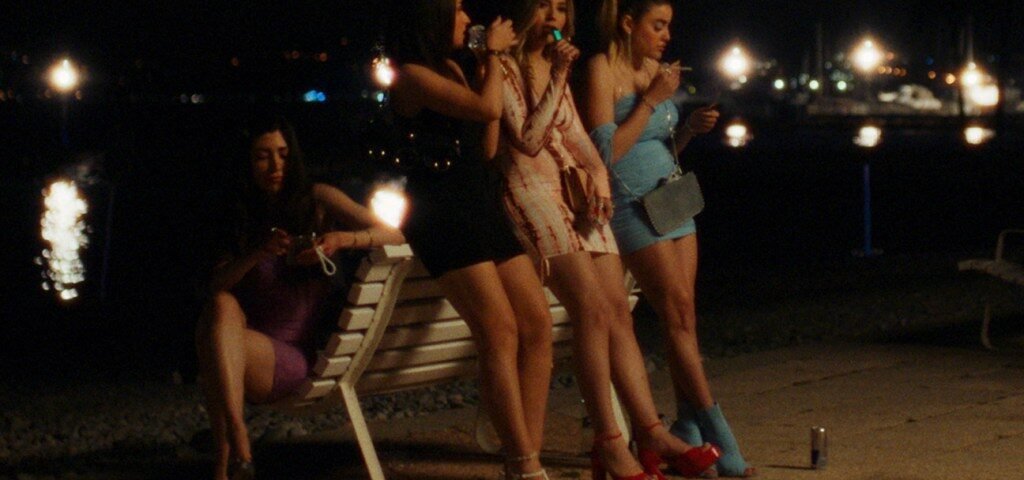


‘Furiosa: A Mad Max Saga’ Review: Anya Taylor-Joy and Chris Hemsworth in George Miller’s Fitfully Propulsive ‘Fury Road’ Prequel
May 22, 2024


‘IF’ Review: Ryan Reynolds Leads a John Krasinski-Directed Family Film That’s Easier to Admire Than Enjoy
May 23, 2024In Agathe Riedinger’s competition entry, a young woman obsessed with beauty and hungry for fame endeavors to become a reality TV star.
Wild Diamond
Alluring but lacking a distinctive edge.
When Liane (Malou Khebizi), the protagonist of Agathe Riedinger’s stylish debut feature Wild Diamond (Diamant Brut), says that she will be the French Kim Kardashian, it sounds more like a prophecy than a desire.
Premiering in competition at Cannes, Wild Diamond is Riedinger’s compassionate contribution to the “perils-of-social-media-and-fame” genre. The film expands on themes first explored in the director’s 2017 short Waiting for Jupiter, which followed a young woman, also named Liane, who, upon finding out she has been selected to participate in a reality television program, proceeds to cut ties with those around her. Riedinger loosely maintains that plot for this feature, but demonstrates a more mature style. She mixes the intimate and candid character studies typical of an Andrea Arnold project (disaffected young woman in troubling situations) with the darker thematic currents of Magnus von Horn’s 2020 drama Sweat, another film about the pitfalls of influencer culture that premiered at Cannes.
Riedinger’s screenplay and camerawork with DP Noé Bach never look down on Liane. In fact, with their close-ups and ethereal visual language, the filmmakers cradle the protagonist, caring for her like she does for her dreams. But all the lingering and indulging does make one wonder about the line between poetic appreciation and a kind of aesthetic fetishization. When does one become the other?
As a working-class young woman with a fractious relationship with her mother (Andréa Bescond), Liane moves through the world with a hardened, self-protective armor. Wild Diamond opens with scenes of Liane’s life: She peddles stolen goods on the street for extra cash; exchanges harsh words with sleazy men who, because she prefers short skirts and stilettos, call her a whore; cares for her little sister Alicia (Ashley Romano); and scrolls through Instagram, noting the devotional messages from her followers and learning from more famous influencers.
In one particularly affecting sequence, we see Liane meticulously glueing rhinestones she pilfered off a blouse at the mall onto a worn pair of silver stilettos. She treats them, and the other items in her closet, with the same overwhelming devotion as Ariel does her grotto treasures. The most interesting moments in Wild Diamond lean into the religious valences of toxic influencer culture. Riedinger smartly maps a relationship between the desire to be famous, class aspirations and the worship of money. Audrey Ismaël’s cello-heavy score and the choice to project the Instagram comments as a dense paragraph recalling a Bible verse give Liane’s obsessions a compelling Catholic touch.
Liane is a fully realized character, and Khebizi’s grounding performance keeps her from feeling like an assemblage of clichés. Unfortunately, that’s not the case for the characters who surround her. It seems the other people in Liane’s orbit exist to counter her obsession with sometimes engaging but usually obvious arguments about life’s other beauties. A relationship with her crush (an appropriately sensitive Idir Azougli) suffers most from this: Whereas Liane focuses on aesthetics, Dino finds the natural world enchanting. Liane’s ties with her close friends occasionally introduce genuine tension — especially as they question her rigidity about the importance of beauty and money — but they aren’t developed enough to have staying power.
There’s a curious moment in Wild Diamond when Liane, still waiting for the casting agent to return her calls, films a video for her followers. In it, she cites a belief in God and makes a passing comment about her success as a form of vengeance. The delivery is fervent, casting Liane as a messiah and her quest for fame as a crusade. It’s a prickly sentiment that offers a different perspective on what’s known about the culture bred by social media, and exploring it might have given Riedinger’s film a necessary distinctive edge that it otherwise lacks.





